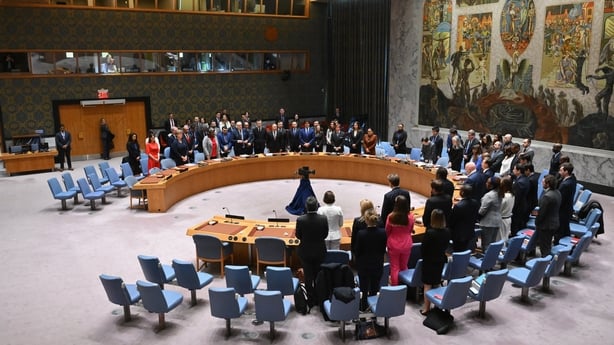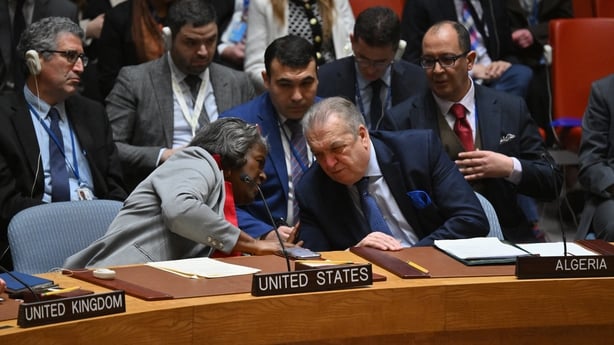The White House has said it is "perplexed" and "disappointed" by the cancelation of an Israeli delegation's planned visit to discuss US concerns over a possible offensive in southern Gaza.
Israel scrapped the visit after the United States abstained from a UN Security Council vote demanding an "immediate ceasefire" in Gaza - a move that Prime Minister Benjamin Netanyahu's office said hurt Israel's fight against Palestinian militant group Hamas.
"We're kind of perplexed" by the cancelation, National Security Council spokesman John Kirby told journalists, saying it "seems like the (Israeli) prime minister's office is choosing to create a perception of daylight here when they don't need to."
Mr Kirby had earlier said Washington was "very disappointed" the delegation would not be visiting, and that the Security Council abstention "does not represent a shift" in US policy.
"We've been consistent in our support (for) a ceasefire as part of a hostage deal," he said, referring to efforts to free the roughly 130 people still believed to be held in Gaza after they were seized in a shock Hamas attack on 7 October.
The United States has backed Israel with both military and diplomatic support, but has voiced frustration with Mr Netanyahu as the civilian death toll in Gaza mounts.
While the delegation's trip has been canceled, a separate visit by Israel's Defense Minister Yoav Gallant is proceeding.
The United Nations Security Council earlier passed a resolution demanding an immediate ceasefire in Gaza.
It is the first time the council has voted for a ceasefire, after four previous attempts resulted in vetoes by permanent members the United States, Russia and China.
Today's text was drafted by the non-permanent members of the council, known as the elected ten and was repeatedly amended to accommodate the permanent members.
Ahead of the vote, the Russian Federation tabled an amendment to revise a last-minute change replacing the word "permanent" sustainable ceasefire with "lasting".
But the amendment was defeated by a US veto.
When council diplomats moved to vote on the resolution, it passed with 14 votes in favour and one abstention, cast by the United States.
Council diplomats applauded the passing of the resolution.

After the US refrained from vetoing the proposal, Israeli Prime Minister Benjamin Netanyahu said he would not send a delegation as planned to Washington.
Mr Netanyahu, according to a statement from his office, said that Washington's failure to block the proposal was a "clear retreat" from its previous position, and would hurt war efforts against Hamas, as well as efforts to release over 130 hostages in Gaza captivity.
"In light of the change in the American position, Prime Minister Netanyahu decided the delegation would not leave," his office said.
The text of the resolution demands "an immediate ceasefire for the month of Ramadan respected by all parties leading to a lasting sustainable ceasefire".
It demands the immediate and unconditional release of all hostages as well as "ensuring humanitarian access to address their medical and other humanitarian needs".
Read more: Israel pounds Rafah, surrounds hospitals in Khan Younis
The resolution also emphasises the "urgent need to expand the flow of humanitarian assistance to and reinforce the protection of civilians in the entire Gaza Strip".
Hamas said it welcomed the resolution and that it stood ready to engage in the immediate swap of prisoners with Israel.
After the vote, the US Ambassador to the UN, Linda Thomas-Greenfield told the council that a ceasefire could have "come about months ago if Hamas had released the hostages".
"Instead, Hamas continues to stand in the way of peace to throw up roadblocks to carry tunnels beneath Gaza cities and behind under civilian infrastructure and hide among the civilian population," she said.
Ms Thomas-Greenfield also accused Russia and China of using the conflict in the Middle East as a "political cudgel" to divide the council.

"They still can't bring themselves to condemn a massive terrorist attack on October 7," she said, "[and] just last week, vetoed a resolution that condemned this horrific attack."
"They have shown time and time again that they are not actually interested in advancing durable peace through diplomatic efforts, for all their rhetoric," she said.
The Ambassador of China, Zhang Jun, responded to the US representative's remarks and said the accusations of the US were "untenable".
"After repeated vetoes of the council's actions, the US finally decided to stop obstructing the council's demand for an immediate ceasefire," Ambassador Zhang said.
In a statement this evening, President Michael D Higgins said an immediate ceasefire and the release of all of the hostages "must now follow".
He said: "The resolution which has just been passed by the United Nations Security Council, and consideration as to what a ceasefire would make possible in Gaza, will surely be welcomed by all, as will their shared hope for a speedy implementation."
"As the UN Secretary-General António Guterres has said, failure to implement the resolution 'would be unforgiveable,'" he added.
Meanwhile, White House national security spokesperson John Kirby said Mr Netanyahu's decision to pull out of the meeting in Washington was unfortunate, but that the US would bring up its concerns about Israel's policies as part of ongoing discussions between the two governments.
He said discussions between visiting Israeli Defence Minister Yoav Gallant and national security adviser Jake Sullivan, Secretary of State Antony Blinken and others would cover the same points that the U.S. team had planned to raise with the delegation.
Additional reporting: Yvonne Murray

